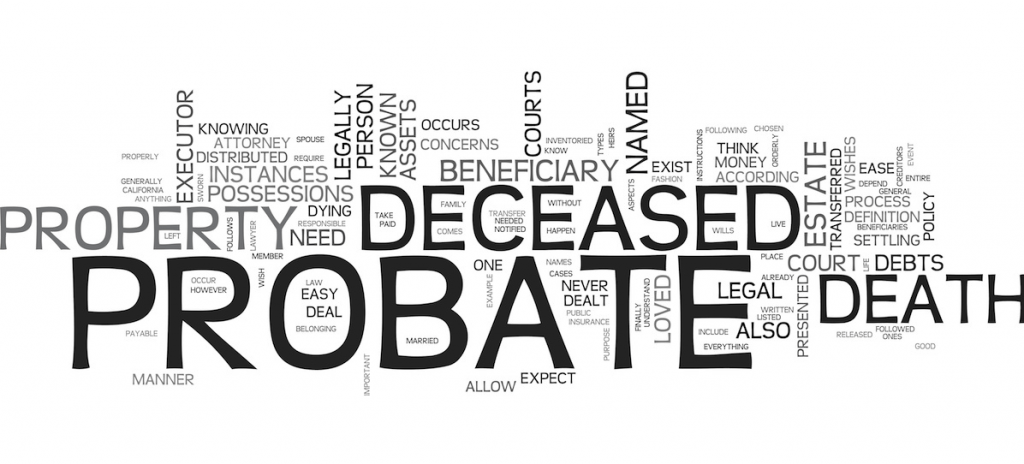We are often asked this question from people who have been named as the Executor in a Will. They need to know if they are personally liable for any debts owed and what if there is not enough in the estate to cover them. What happens to your debt when you die?
Our friends at Ratehub have put together this article for us as a guest post.

Debt is a part of life, and most Canadians are carrying around a significant amount, be it through credit cards, mortgages, and other lines of credit. With so many of us relying on credit, it’s no surprise that people often die with outstanding debts left unpaid.
It’s not always easy to talk about, but it’s important to make a plan for your debt ahead of time. Here’s a primer on what happens to debt when you die in Canada, which can help you get started.
What happens to your debt when you die?
The short answer is your debt doesn’t get passed on to your family, even to your spouse. Instead, your debt stays with your estate. This does mean your estate must pay off your remaining debt – as well as taxes owed – before any of your assets can be inherited by your chosen beneficiaries. The Executor of your Will also won’t be personally responsible for paying your debts either.
There are two main exceptions to this, the first being joint debt. If the deceased co-signed a loan with a partner, the partner would take over responsibility for the debt. The second exception is for federal student loans, which are generally forgiven upon either the death or permanent disability of the borrower. Private student loans, however, are treated like normal debt.
How are you taxed when you die?
A deceased estate must submit a final tax return and, as with outstanding debt, pay all taxes owed before any assets can be inherited. When someone dies in Canada, they are considered to have disposed of all of their possessions at fair market value at the moment of their death. This can result in taxes being owed.
This isn’t the same as an inheritance tax, which would be levied on the actual value of the estate. Unlike the USA, Canada doesn’t have an inheritance tax. Rather, any taxes payable after death come from the final tax return for income earned in the final year of life, including the disposal of worldly possessions. A common source of these taxes is capital gains on property that’s been in the family for a long time.
A quirk exists in the case of a surviving spouse. Canada allows the transfer of property, as well as marketable securities and shares in private companies, to a surviving spouse without triggering capital gains taxes.
What happens to your mortgage when you die?
It’s not uncommon for people to die before their mortgage is fully paid off. Fortunately, because mortgages are secured by the home, there’s an asset to help pay off the unpaid mortgage. The bad news is that without proper planning, this can mean selling the family home.
Generally, the mortgage will stick to the home itself. If a person dies and transfers their home to a surviving spouse (without triggering capital gains) the mortgage will be transferred as well.
If your home is jointly owned, it can be owned as “tenants in common” or as “joint tenancy with the right of survivorship”
It’s important to note that to transfer a home to your spouse if it is jointly owned as joint tenancy, you’ll need to write a Will naming your spouse the main beneficiary. If you haven’t, your estate (including your share of the home) will be divided according to intestate laws, and there’s a good chance your home will have to be sold in order to be divided between your spouse and children (or other beneficiaries).
If a surviving spouse can’t service the mortgage, they have the option of selling the home to pay it off. Depending on the spouse’s situation, it might be possible to refinance the mortgage to make the payments more manageable, by extending the total life of the mortgage, for example.
If a single person died with an unpaid mortgage, the estate would be required to pay back the mortgage before any assets can be inherited. There are a few ways to fund this, including selling the home or using a life insurance benefit (more on that below). In order to avoid the forced sale of your family home, it’s essential to have a plan for your mortgage.
What happens to your credit card debt when you die?

According to the Canadian Bankers Association, three out of ten Canadians don’t pay off their credit card in full every month. Recent statistics from Equifax Canada puts our average non-mortgage debt load (including credit cards and other loans) at around $23,800.
So, will your family and loved ones inherit your credit card debt when you die? As with other types of debt, the quick answer is no. In almost all cases, credit card debt cannot be inherited, though there are situations when it can affect the finances of those you leave behind.
Just like a mortgage, If a person dies while still owing credit card debt, creditors (like banks) can claim the money they’re owed from the deceased person’s estate. If a claim is successful, creditors would be paid out by the estate before beneficiaries receive any inheritance. In short, while loved ones won’t be obligated to pay off your credit card debt, the inheritance you may have left behind for them can be affected.
Credit cards can be great financial tools, but they must be managed carefully. As much as possible, credit cards should only be used to make purchases you know you can afford to pay back by the end of the month. If you do carry a balance, you may want to use alternatives like low-interest credit cards to help you accumulate less interest on the debt you owe. The less you owe in your life, the less your estate will be affected after you die.
If you’re currently struggling with major credit card debt, you may want to consider seeking financial support from a debt counseling agency and having an open and honest discussion with your most trusted loved ones, particularly if you’re currently preparing your will and the details of your estate.
Joint debt
While debt cannot be inherited in Canada, joint debt makes things a little tricky. If you take on a joint loan with another person and they co-sign the application, both of you will be held responsible for paying it off. If one of you were to die, the other would be wholly responsible, not the deceased estate.
In the case of credit cards, most Canadians who share a card don’t do so as co-signers but as authorized users. Authorized aren’t legally obliged to pay off any card debt, but simply have permission to use another person’s credit card to buy items. Nevertheless, if you do share a card in any way with another person, it’s smart to read the fine print of your cardholder agreement to fully grasp any potential repercussions.
How life insurance helps
For most people, the solution to paying off debt when they die is having a good life insurance policy. Life insurance pays a tax-free benefit upon death, which can be used to pay off debt or tax liabilities, including credit cards, mortgages, and taxes. This preserves your savings and assets for your loved ones to inherit.
There are many different life insurance policies available, and each type is tailored to suit a different kind of person – be sure to compare life insurance policies before you make a decision. Whatever type you choose, your death benefit should be enough to cover several costs:
- All outstanding debts
- Your expected tax liabilities at death (eg capital gains)
- Income replacement to support any dependents you have
- Any amounts of money you planned to save, eg university tuition for your kids
Once you have a life insurance policy in place, it’s essential that you maintain it and pay the premiums. The last thing you want is to pass away and have the policy not pay out for some reason.
Debt-specific life insurance policies
Some life insurance policies have been made to specifically cover outstanding debts. These products are worth understanding, but they aren’t always worth purchasing.
Mortgage life insurance is a life insurance policy you might be offered when applying for a mortgage (it’s different from mortgage default insurance). Mortgage life insurance is a policy taken out by your lender, though you pay the premiums. If you die, the life insurance company will pay out the remaining mortgage to your lender, and your estate will keep the home.
Mortgage life insurance is convenient, but it’s generally more expensive and less flexible than a stand-alone life insurance policy. It also doesn’t cover the cost of capital gains tax, whereas a stand-alone policy could. You’re often better off arranging your own life insurance coverage instead of purchasing mortgage life insurance.
Credit card insurance: Many credit cards offer balance protection, an optional type of credit card insurance. Balance protection can help reduce the burden of card payments during a job loss and, in some cases, full debt relief in the event you die.
Balance protection insurance is a little contentious in personal finance circles, as credit card debt generally can’t be inherited. Many would argue balance protection is unnecessary, costs too much, and the cost of premiums would be better spent paying down your balance. The cost of balance protection can vary by bank, but often hovers around $0.99 per $100 you owe on a card.
As with mortgage life insurance, you can cover your credit card debt with a life insurance policy. In fact, you can use a single life insurance policy to cover all of your debts, which avoids having to maintain multiple policies.
The bottom line
The prospect of death is not a nice one to think about. However, your estate getting eaten away by outstanding debt is even worse! In order to preserve your estate in the event of your death, the best thing you can do is to plan ahead.
Start by making a plan to pay off your debt quickly. Then, arranging protection for your family in the form of a sturdy life insurance policy. If you haven’t made a will, this is a perfect time to do so. It’s never too early to plan for the unexpected, protecting the people you love in the process.
Guest post by Tim Bennett, Content Writer at Ratehub.ca. Ratehub.ca is Canada’s leading comparison site for mortgage rates, credit cards, bank accounts, investing products and insurance rates.
- A young person’s guide to writing a Will - September 23, 2022
- Advance Serious Illness Planning – how does this fit into an estate plan? - February 5, 2021
- Why writing a Will is the first thing to do as a new parent - September 3, 2020













